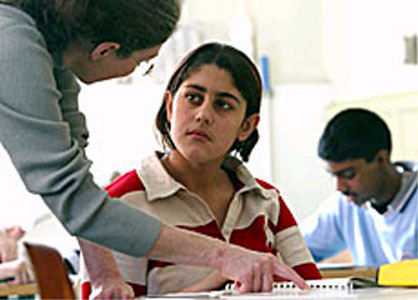
The long road to integration

On September 26 the Swiss people are voting on whether to grant citizenship to young foreigners living in Switzerland.
However, a survey reveals that the mere fact of having a passport may not be enough to prevent discrimination, especially in the workplace.
Immigration is a fact of Swiss life. One inhabitant in five does not possess the coveted red passport emblazoned with a white cross.
“But Switzerland is the context in which many of these foreigners, and especially their children, will live their lives,” said Rosita Fibbi, a sociologist at the University of Neuchâtel.
Large numbers of them have spent many years in Switzerland and are part of the country’s social fabric, yet as many as half a million children of immigrants do not have Swiss nationality.
Equal opportunities
But it is not only at the political level that young foreigners experience discrimination: statistics indicate that they have far more difficulty in getting a job or being accepted for training.
By submitting fictitious applications, a research group at the Forum for Migration and Population Studies, where Fibbi is a senior manager, has revealed the difference in the way Swiss citizens and immigrants are treated.
While the children of Portuguese or Spanish immigrants have roughly the same chance of being invited to a job interview, the situation is far more problematic for those with a Turkish or Slavic-sounding name.
On average, in German-speaking Switzerland, only 59 children of eastern European immigrants were invited to an interview for every 100 Swiss.
In French-speaking Switzerland, the attitude towards foreigners is slightly more open.
“This clearly shows that there is a deeper form of discrimination, quite apart from the question of political rights. This is an issue that persists into the second generation,” said Fibbi.
Step towards integration
Observers say reform of the citizenship legislation is unlikely to sweep away people’s mistrust of foreigners. But they believe it does represent a step forward in ensuring equality in the eyes of the law for those who want to become Swiss.
The proposed amendments would standardise procedures at the federal level and do away with the exorbitant fees charged by some local authorities for processing citizenship applications.
It would still be left to the local authority to decide whether or not candidates should be naturalised, but fair treatment would be guaranteed for all.
This would put an end to extreme cases of the kind seen in the town of Emmen near Lucerne, where candidates of Balkan origin have been refused Swiss nationality on several occasions.
These have provoked indignation both at home and abroad, but such cases are by no means exceptional in Switzerland.
However, the survey conducted by the Neuchâtel-based forum revealed that nationality was not the only factor involved where job applications were concerned.
A young person with a Swiss passport but a foreign-sounding surname experienced the same difficulty in finding work as counterparts armed only with a residency permit.
Fast track for young people
Fibbi believes this month’s vote is very much a test of how the Swiss relate to their immigrant neighbours.
However, she is optimistic that they will grant citizenship to second- and third-generation foreigners.
“The new rules, which are endorsed by a broad majority in parliament, are a simple recognition of the situation as it now exists in Swiss society,” she said.
The poll also comes down to a vote of confidence in the Swiss education system.
Parliamentarians behind the reforms claim that young people who receive basic schooling and vocational training are familiar with the language and the requirements of being a Swiss citizen.
Opinion polls predict that the Swiss people will also give their approval to the proposed constitutional changes.
swissinfo, Daniele Papacella
Roughly half a million second- and third-generation immigrants live in Switzerland. Most of them are fully integrated and speak the local language.
Of these, around 117,000 would be eligible to apply for Swiss citizenship under new simplified criteria.
Officials estimate that the number of naturalisations would temporarily increase by 40% a year to 52,000.
At the end of 2003, there were 1,471,033 foreigners living in Switzerland
This is equivalent to 20.1% of the population.
Of these, 350,000 were born in Switzerland.

In compliance with the JTI standards
More: SWI swissinfo.ch certified by the Journalism Trust Initiative


























You can find an overview of ongoing debates with our journalists here . Please join us!
If you want to start a conversation about a topic raised in this article or want to report factual errors, email us at english@swissinfo.ch.